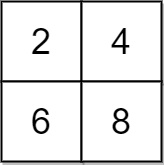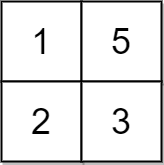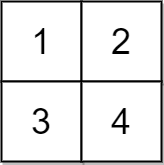You are given a 2D integer grid of size m x n and an integer x. In one operation, you can add x to or subtract x from any element in the grid.
A uni-value grid is a grid where all the elements of it are equal.
Return the minimum number of operations to make the grid uni-value. If it is not possible, return -1.
Example 1:
Input: grid = [[2,4],[6,8]], x = 2 Output: 4 Explanation: We can make every element equal to 4 by doing the following: - Add x to 2 once. - Subtract x from 6 once. - Subtract x from 8 twice. A total of 4 operations were used.
Example 2:
Input: grid = [[1,5],[2,3]], x = 1 Output: 5 Explanation: We can make every element equal to 3.
Example 3:
Input: grid = [[1,2],[3,4]], x = 2 Output: -1 Explanation: It is impossible to make every element equal.
Constraints:
m == grid.lengthn == grid[i].length1 <= m, n <= 1051 <= m * n <= 1051 <= x, grid[i][j] <= 104
class Solution:
def minOperations(self, grid: List[List[int]], x: int) -> int:
nums = []
mod = grid[0][0] % x
for row in grid:
for v in row:
if v % x != mod:
return -1
nums.append(v)
nums.sort()
mid = nums[len(nums) >> 1]
return sum(abs(v - mid) // x for v in nums)class Solution {
public int minOperations(int[][] grid, int x) {
int m = grid.length, n = grid[0].length;
int[] nums = new int[m * n];
int mod = grid[0][0] % x;
for (int i = 0; i < m; ++i) {
for (int j = 0; j < n; ++j) {
if (grid[i][j] % x != mod) {
return -1;
}
nums[i * n + j] = grid[i][j];
}
}
Arrays.sort(nums);
int mid = nums[nums.length >> 1];
int ans = 0;
for (int v : nums) {
ans += Math.abs(v - mid) / x;
}
return ans;
}
}class Solution {
public:
int minOperations(vector<vector<int>>& grid, int x) {
int m = grid.size(), n = grid[0].size();
int mod = grid[0][0] % x;
int nums[m * n];
for (int i = 0; i < m; ++i) {
for (int j = 0; j < n; ++j) {
if (grid[i][j] % x != mod) {
return -1;
}
nums[i * n + j] = grid[i][j];
}
}
sort(nums, nums + m * n);
int mid = nums[(m * n) >> 1];
int ans = 0;
for (int v : nums) {
ans += abs(v - mid) / x;
}
return ans;
}
};func minOperations(grid [][]int, x int) int {
mod := grid[0][0] % x
nums := []int{}
for _, row := range grid {
for _, v := range row {
if v%x != mod {
return -1
}
nums = append(nums, v)
}
}
sort.Ints(nums)
mid := nums[len(nums)>>1]
ans := 0
for _, v := range nums {
ans += abs(v-mid) / x
}
return ans
}
func abs(x int) int {
if x < 0 {
return -x
}
return x
}


